31 de julio 2022

Children of Exile: The Births “Sowing Hope” in the Camp of Nicaraguan Farmers

PUBLICIDAD 1M
PUBLICIDAD 4D
PUBLICIDAD 5D
This 22-year-old Nicaraguan woman wants to be the first astronaut from her country; and, step by step, she’s moving towards her goal
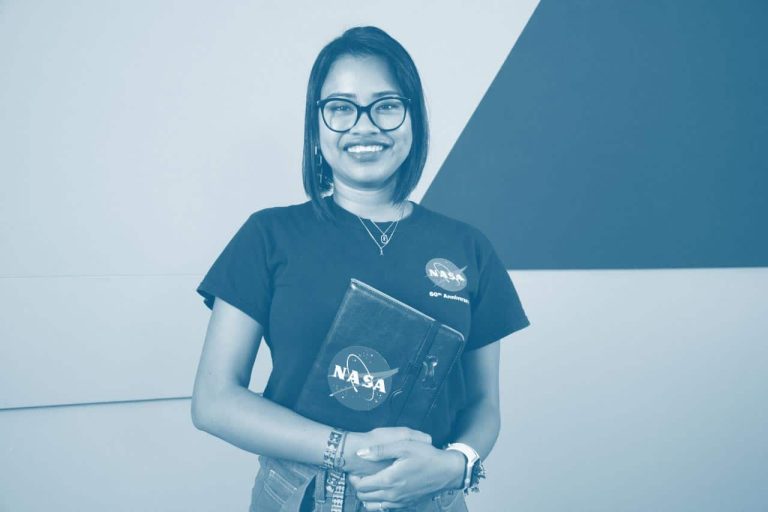
Is it possible to go to the moon? A little girl used to wonder this while she looked up at the starry sky from her remote Miskito community in the municipality of Puerto Cabezas, in Nicaragua’s Autonomous North Caribbean Region.
In 1969, Neil Armstrong had been the first person to walk on the moon; six years before, Valentina Tereshkova had been the first woman to travel in space. Achieving something like that was a very distant dream for the little girl, as she lost herself in ecstatic contemplation of that vast and brilliant sky, observing it from a part of Nicaragua with the one of the lowest levels of light pollution.
Today that dream of traveling beyond the planet no longer seems so distant for Roxy Williams. At 22, she’ll become the first Nicaraguan to receive the distinction of “Emerging Space Leader” from the International Astronautical Federation, in recognition of her contributions and space research. The Federation is an international space advocacy organization based in Paris, France, that seeks to coordinate research in the field from different countries.
The recognitions she’s received motivate Roxy to maintain her desire to be the first Nicaraguan woman to become an astronaut.
“The universe is so incredible and extraordinary,” the young woman expresses enthusiastically. She recalls feeling this the first time she read about the planets and the phases of the moon in the “Manual of Astronomy for Central Americans”, by Jaime Incer Barquero. She was still a little girl. “That book inspired me greatly to begin to investigate and become more involved,” she remembers. In addition, it was one of her first major contacts with the Spanish language, which she had to improve on since her first language is Miskito.
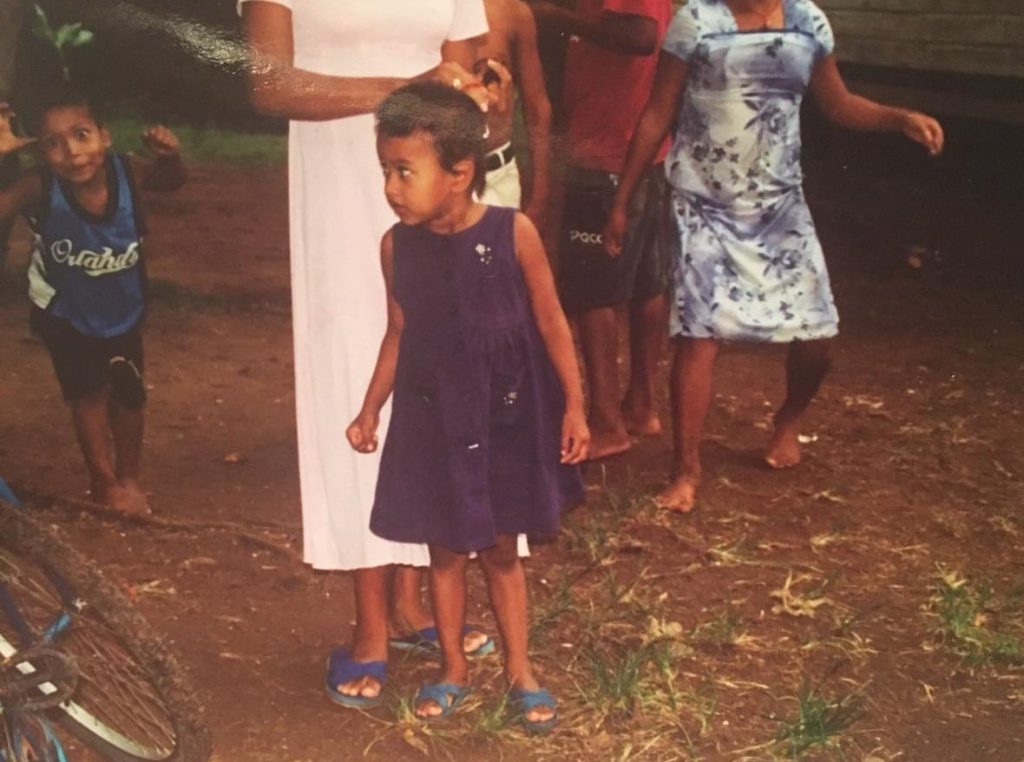
Roxy Williams as a child in her community near Puerto Cabezas. Courtesy photo
When she was nine, her family moved from Nicaragua’s North Atlantic Region to Managua, the capital, to seek better educational opportunities for Roxy and her younger brother. Even though the move presented challenges, it was also an important step forward. In her original community, it’s not very common for women to leave the area with the goal of becoming a professional. “From the time I was little, I always had that desire to get away, learn, get an education and later look for a way to bring the benefit of my learning back to the community,” affirms Roxy.
In high school she became interested in exploring new fields of knowledge and in developing new skills. She learned about human rights and participated in scholastic competitions in public speaking, which helped her polish her Spanish.
In 2015, Roxy once more connected with her early passion for space, when she participated with a friend in the NASA Space Apps Challenge Nicaragua. This was a “hackathon” – an encounter for programmers – that brought together thousands of citizens from around the globe using data from open source codes. “At that time, we didn’t know anything about open source codes or about programming, but we decided to register in order to learn,” she tell us, laughing.
In the “hackathon”, she met Professor Julio Vannini, at that time president of the Nicaraguan Association of Amateur Astronomers. “He asked me what my interests were and I told him that I wanted to be president of Nicaragua. He looked at me laughing and said: ‘Wouldn’t it be better to be the first Nicaraguan to go into space?’” recalls Roxy. That question changed her life forever.
Professor Vannini also encouraged her to participate in the second Aerospace Camp, organized by the University of Costa Rica in 2016. This initiative sought to motivate the student population to study careers related to the aerospace industry. The camp was only for Costa Ricans, but thanks to her enthusiasm and background, she was selected along with 49 other young people. “I screamed with excitement when they selected me,” she recalls.
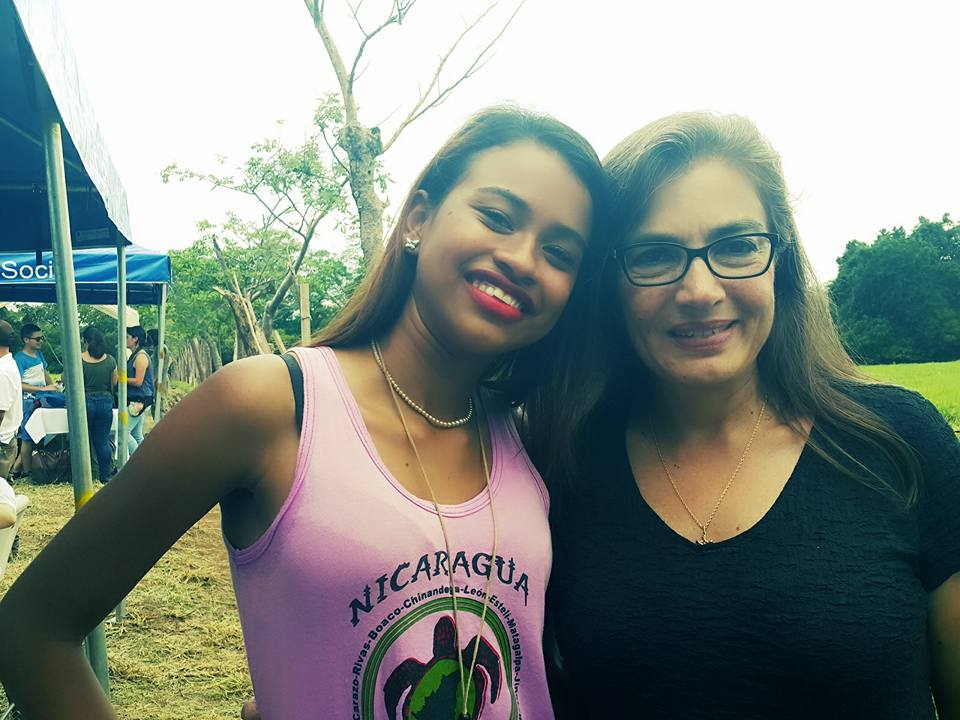
Roxy, together with Costa Rican engineer Sandra Cauffman, during the 2016 Aerospace Camp. Courtesy photo.
During the camp, she learned to make solid fuel rockets and met outstanding personalities from the aeronautical and aerospace industry, including Costa Rican engineer Sandra Cauffmann, assistant director of NASA’s astrophysics division. Sandra became her friend and mentor. “She’s an inspiration to me – as a person, a woman and a Central American,” states Roxy.
Following her participation in the Aerospace Camp in Costa Rica, Roxy returned to Nicaragua determined to study a career that would allow her to prepare to become an astronaut. She entered Keiser University’s Latin American campus in Nicaragua, studying software engineering, thanks to a scholarship she received for her academic excellence at the Nicaragua Christian Academy in Nejapa.
The following year, she participated as a student in a course in Scientific Computing through the Harvard University extension program. She would later become an instructor in this program.
In 2018, Roxy and her family emigrated to Costa Rica, due to the socio-political crisis that erupted in Nicaragua that year. Thanks to the economic efforts of her parents, she was able to resume her university studies at the Costa Rican campus of Texas Tech University, this time with a major in Applied Mathematics.
In December of that year, she participated in the fifth Feminine Hackathon of Costa Rica, this time as a mentor. The event dealt with satellite technologies and was held in the city of Limon, on Costa Rica’s Caribbean Coast, organized by the Costa Rican cooperative Sula Batsu.
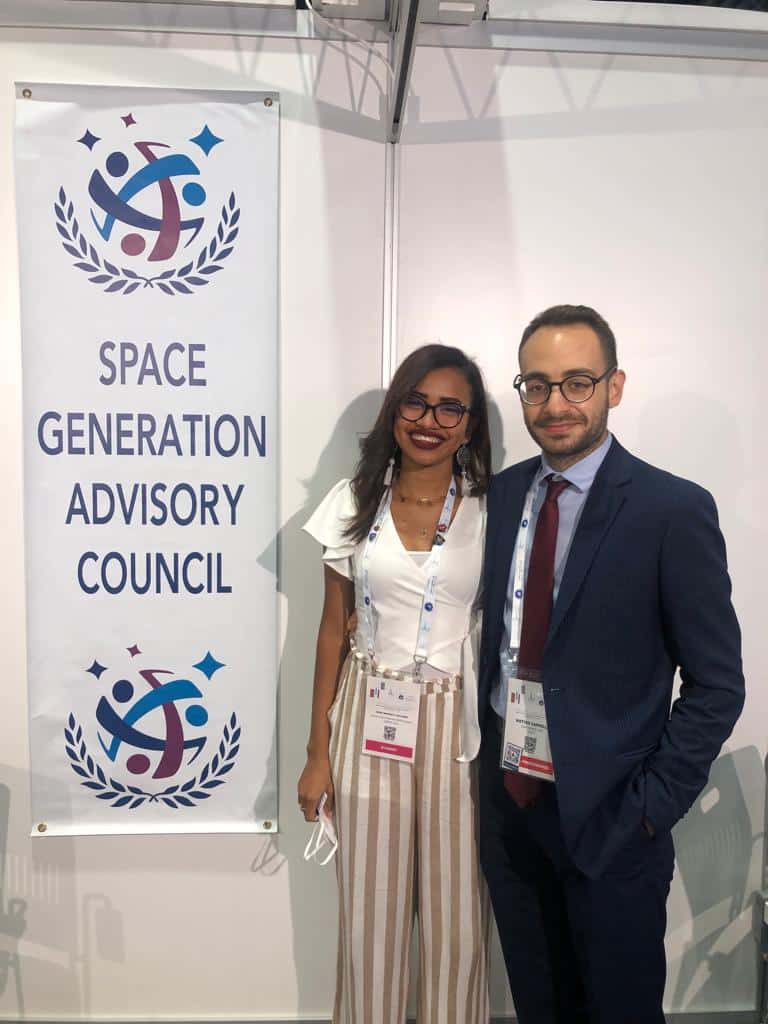
Roxy Williams with Matteo Capella, former project director for the Space Generation Advisory Council. Courtesy photo
In June of 2019, she was selected as the Space Generation Advisory Council’s [SGAC] national contact for Nicaragua. The SGAC is a global network of people interested in space, with over 130,000 members.
In 2020, the pandemic forced Roxy to leave her Mathematics studies. “I stopped studying for a time, and began to work,” she says. Nonetheless, other doors opened for her. She succeeded in taking an open course in space engineering, and shortly afterwards replicated these workshops for young Nicaraguans, Costa Ricans and Salvadorans.
“We had a lot of Nicaraguans in the second edition, and we later offered a third edition with more spots for them, because they were the majority of those who registered,” she expresses with emotion.
Following these workshops, Roxy and her team conducted an investigation to learn about the impact of this educational process on the space education of Nicaraguan youth. The results were very positive: “There was a considerable change,” she affirms.
Inspired by the results, she organized a series of ten workshops exclusively for Nicaraguans, where the young people learned about different space topics from experts in the field. “The objective was to demonstrate that it didn’t matter what career you were studying; if you like space, you can combine both things,” Roxy comments.
These initiatives of Roxy’s succeeded in inspiring other young people to look into the study of space and its mysteries. “Dagoberto Tellez is a youth who participated in the workshops and we later participated together in one on designing small satellites. He applied to a university in the United States, and now he’s studying a career in science and technology,” Roxy says with pride.
In 2021, Roxy returned to her Software Engineering studies at the Latin American University of Science and Technology in Costa Rica. She was awarded three different international prizes for her work and leadership in the space sector. The first recognition was a Global Grant scholarship to participate in the 72nd session of the International Astronautical Congress, and in the 19th Space Generation Congress, which were held last year in Dubai, in the United Arab Emirates.
The second was the Pioneer Award that the SGAC grants annually to young people from different parts of the world who have distinguished themselves by carrying out scientific and technological projects.
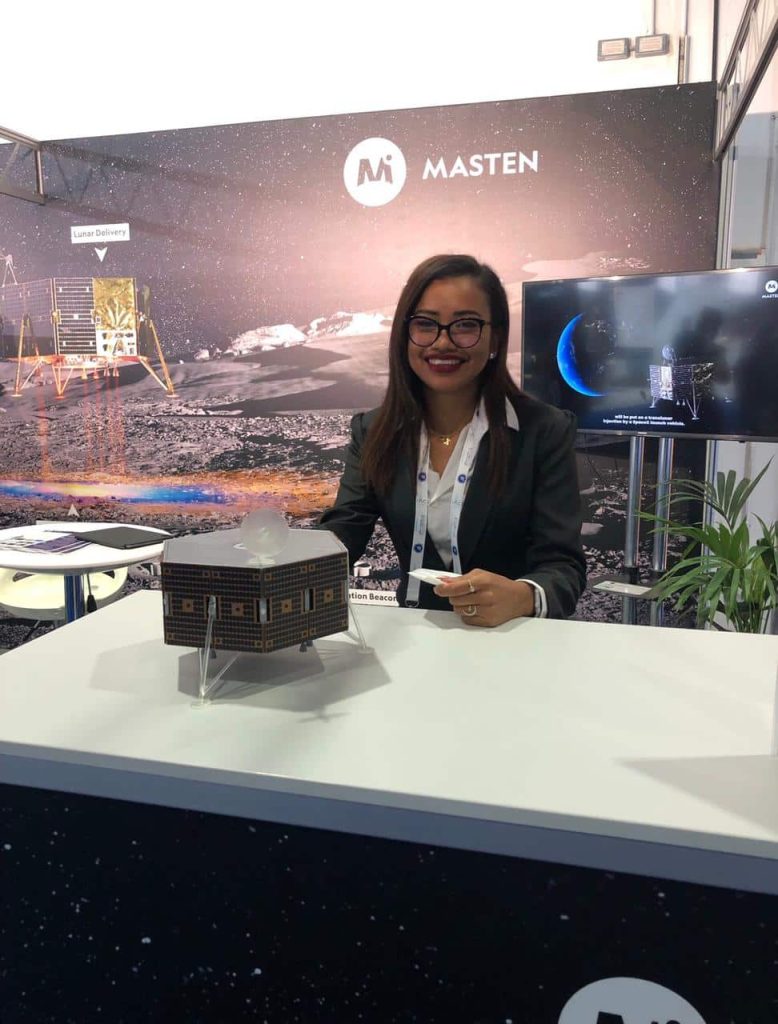
Roxy Williams at the 72nd International Aeronautical Congress. Courtesy photo
Roxy also received a prize from the SGAC for her outstanding work as a national contact, and for the impact of the opportunities she opened for Nicaragua youth. “I’m convinced that Roxy is, and will be, a source of inspiration for the youth of Nicaragua,” Matteo Capello, former project director for the organization, said about Roxy’s receipt of this recognition.
Recently, the International Aeronautical Federation recognized her, together with another 29 young people from around the word, for her work as an Emerging Space Leader. Roxy will receive that award next September in Paris. “I’m very moved to think that I’m the first person from Nicaragua to receive this award,” Roxy expresses, as she reflects on all she’s achieved.
At the end of 2021, she became the president of the Society for Women in Space Exploration, a Costa Rican organization that promotes and encourages women and fights for diversity and inclusion in the multi-disciplinary fields of space exploration.
Currently, the young Nicaraguan is working on different projects that will allow her to fulfill her dreams of giving back to the Nicaraguan community where she grew up.
“I’m working with an organization called Geo Indigena that supports the indigenous communities by developing space-related projects to solve problems in their communities. We’re using satellite data on the Earth to identify more adequate places to build shelters in the Caribbean area of Nicaragua, to be used during natural disasters,” Roxy explains. She’s working on this project together with a colleague of the GEO indigenous alliance and F. Gómez, a NASA researcher.
“It’s important to build adequate shelters and to make sure that people in the community have access to that information,” Roxy adds.
Parallel to this, she’s working on the design for a space mission to extract samples of the planet Mercury, as subsystem leader in the management of spacecraft commands and data. She’s also working as part of the communications team charged with developing communication strategies between the spacecrafts and the earth. “[Mercury] is among the planets least explored,” Roxy affirms.
In addition to that, she’s working on one investigation to propose strategies to diversify the selection of astronauts, and on another regarding space education in Nicaragua. She’ll present these studies during her trip to Paris.
Roxy feels that her family, along with the people who have inspired and supported her, have been decisive in helping her attain her success. In five years, she hopes to begin studying for a Master’s in Aerospace Engineering, thus beginning the process of preparing to apply to NASA as an astronaut. This outstanding young woman advises others to: “Yell so loudly that the whole world hears you, and space shines for you.”
This article was originally published in Spanish in Confidencial and translated by Havana Times
PUBLICIDAD 3M
Periodista y productora audiovisual nicaragüense. Licenciada en Ciencias Políticas. Cofundadora de varias organizaciones de sociedad civil vinculadas a la lucha por los derechos de la comunidad estudiantil en Nicaragua. También se ha desempaño en proyectos de transformación digital para empresas y organizaciones.
PUBLICIDAD 3D